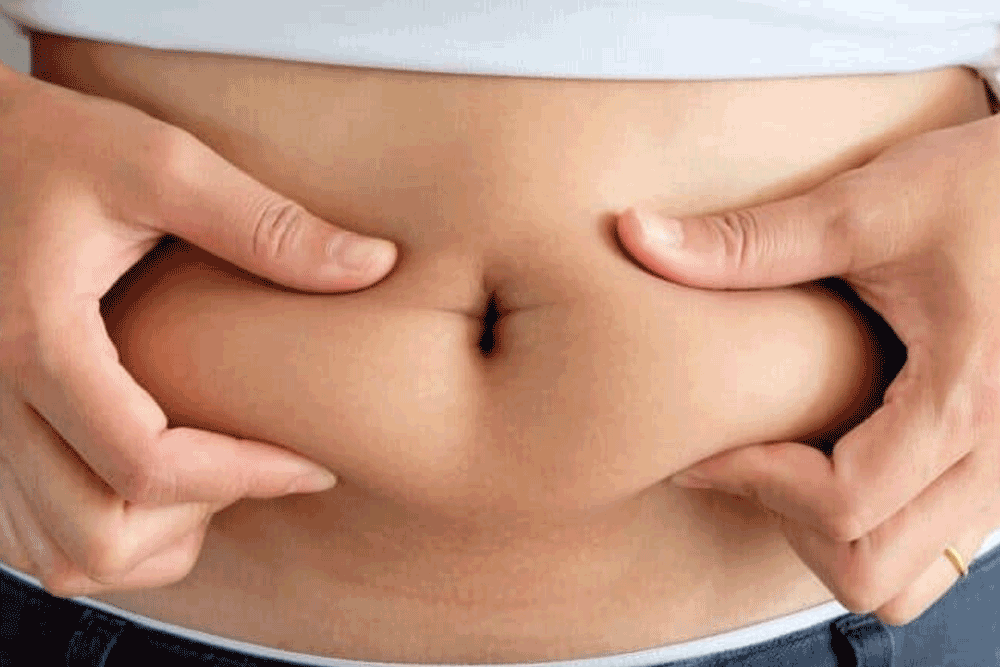
It has become very popular these days with the rise of the Keto diet for personal trainers and people in the health and fitness industry to go around saying that insulin is the reason you’re not losing fat or its the reason you’re putting fat on. They have tarnished the reputation of this hormone that is is so important for our bodies that if it doesn’t work properly, it can lead to serious complications. In this article we will answer some of the common myths and misconceptions surrounding insulin.
If you remove carbohydrates from your diet then suddenly lose weight, it’s because you have reduced calories from removing a food group, not because carbs and insulin are bad. Insulin’s job in the body is to remove macronutrients from the blood stream and into cells because if your blood sugar levels get too high you can die. So say you have a meal which contains protein and carbohydrates (fats tend not to raise blood sugar too much at all) then the blood sugar levels will rise, if they start to get too high insulin will be released by the pancreas to bring the blood sugar levels down before they become toxic.
“Carbs make you fat because of insulin!”
This is still a pretty firmly held belief, it’s something we still hear said over and over again which is a shame because if we understand this hormone better we can help people lose weight way more effectively. The main underlying principle of fat loss or weight loss is being in a calorie deficit, when we match calories and protein we have repeatedly seen that it doesn’t really matter whether carbs or fats are more dominant as the remainder of the calories the weight loss and fat loss will be virtually identical. We have seen this the most recently in a study by Hall et al. 2015 (revised and reviewed in 2016, 2017 and 2018) compared 2 groups of people on iso-caloric diets with matched protein, one group eating high carbs do the other high fat that by reducing dietary fat reduced in more weight loss in obese people than reducing carbohydrates contrary to popular belief. If carbohydrates automatically made you store fat regardless of whether you eat in a calorie deficit or not then in that study we would have seen the high carbohydrate group lose no weight or fat whatsoever regardless of the calories deficit, and the low carb group lose a lot. Also if carbs spiking insulin automatically made people put on weight regardless of the calorie deficit, then why do we see so many people who eat high carbs and are lean? Like bodybuilders/physique competitors both natural and assisted, footballers, martial artists, endurance athletes, etc?
Surely if the hormonal effects of eating carbohydrates outweighed the thermodynamics of calories in vs calories out these people should be fat right? Below are some graphs from the study by Hall et al. (2015) revised and revisited in 2016, 2017 & 2018:
Red line = High carb low fat
Blue line = High fat low carb
Bare in mind this was one of the most sophisticated, expensive studies ever conducted, the participants were in a metabolic ward meaning they could only eat and drink exactly what the people conducting the study gave them so perfect adherence was guaranteed. You can see:
Fig. G: High carb low fat resulted in largest change in fat mass projected over 6 months
Fig E. High carb low fat resulted in the largest change in fat mass
Fig D. High carb low fat resulted in the highest cumulative fat change
Fig A. High carb low fat resulted in the largest change in fat balance
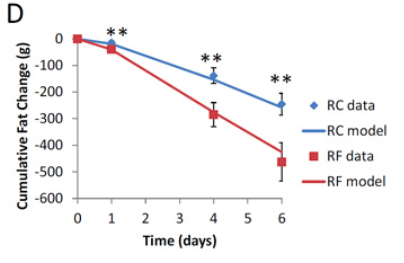
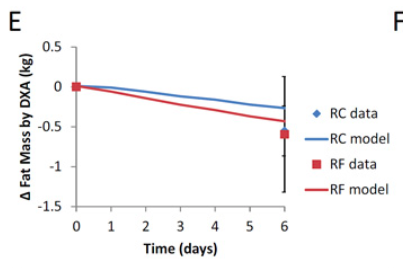
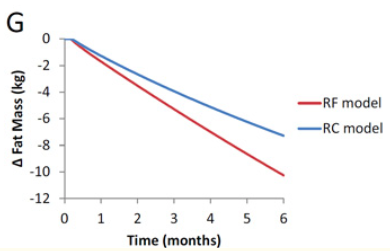
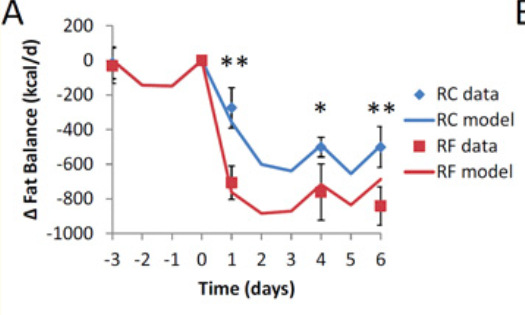
It is also noteworthy that the people in this study were obese, so the very people you would expect should stay very clear of carbohydrates actually showed greater improvements from a high carb diet rather than a high fat, low carb ketogenic style diet.
“But low carb diets are better for fat burning!”
This comes from studies which compare high carb or low carb diets showing that the body ‘oxidises’ more fat for more of the day on a low carb day because these people eat more fat to replace the carbs. However there’s a big difference between ‘fat oxidisation’ and actually losing stored body fat, just because you oxidise more fat doesn’t mean you will lose more fat, its very possible you could eat zero carbs and lots of fats (therefore oxidising fats all day and night) and STILL not lose any body fat because you’re still in a surplus, so you’ve violated the main principle behind fat loss so it doesn’t matter.
All fat oxidisation means is your body is primarily using fat as a fuel source, which is probably because you’re not giving it its preferred source (carbohydrates) to burn so it has little choice but to burn fat. The body will burn whichever fuel source is most prevalent, ideally carbohydrates because they’re the easiest to breakdown and use as fuel, especially for high performance. So again, if calories and protein are matched you can use either carbs or fat or both for your fuel source and the difference in fat loss will be virtually the same, so which ever fits your lifestyle and food preferences to increase your adherence is advised!
“Excess carbs turn straight to fat!”
The process of physically turning excess carbohydrates directly to stored fat is called ‘De Novo Lipogenesis’ and is a very energy expensive process (as shown by Leitch et al 1991), meaning the body will only do this as an absolute last resort. Even with extreme carbohydrate overfeeding, de novo lipogenesis doesn’t occur to any great extent, all that happens is any dietary fat that you’re eating doesn’t get chance to get burned off (because off all the carbs you’re overeating) so this fat you’re eating is just getting stored. If you keep fat very low you can eat lots of carbs without seeing them be converted to fat, all your body does is significantly increase it’s carbohydrate burning levels as shown in a study by Acheson et al. (1988) de novo lipogenesis only started to store fat when carbohydrates exceeded 1000g per day! Seriously try and eat this many grams of carbohydrates in a day for 7 days its very difficult!
This is very useful information because it means if we ever need to do a carb re-feed which you may need/want to do for various beneficial reasons, we know to keep fat low and carbohydrates really high to make sure we don’t put any body fat on!
Basically you can eat as many carbs as you want so long as your protein stays the same and you don’t exceed your maintenance calories and you won’t automatically store fat, if you do then you’re eating too much, then yes if there is ‘excess’ of any macronutrient for that matter, therefore calories, you’ll’ rather than ‘you all’
“Sugar is as addictive as cocaine”
This mainly comes from animal studies that show even when the rats get hooked on IV cocaine, once you introduce sugar then almost all of the rats choose the sugar over the cocaine. Animal studies like the ones done in rats very rarely translate over into humans, and I don’t know about you but i’m not a rat so this is pretty useless data. We know from the HUMAN literature that there is no support of the theory that sugar may be PHYSICALLY addictive, PSYCHOLOGICALLY yes maybe but you don’t get physical withdrawal symptoms like waking up in cold sweats if you cut sugar out.
“Too many carbs at one meal will make you feel sleepy because it spikes insulin!”
This too has never been proven in any sort of research, yes there is an insulin spike but the reason you feel tired after a meal is dependent on the size of the meal not its macronutrient content. If you eat a very large meal that has a large digestive load then it will require a lot of blood to be sent to the digestive system to help deal with it. This blood will be draw from the muscles causing you to feel a bit tired and weak, this is called ‘post prandial somnolence’, or more commonly known as the food coma.
Its not just carbohydrates that can spike insulin too, in a study by Holt et al. (1997) they looked at the insulin release following certain foods by testing it in the blood. They found beef and bread had the SAME insulin secretion, and fish and rice had the SAME insulin secretion. This means that if carbohydrates were to automatically make you fat then protein would too!
It has been shown that carbohydrates do help with deep, restful sleep, but that doesn’t mean that carbs will PUT you to sleep! Even knowing this information can help us because if we know that a large meal will make us feel sleepy, and you’re the sort of person that might struggle to get enough sleep, you can have your last meal of the day as your biggest to help with sleep which will in turn have multiple other benefits like productivity, vitality, performance etc.
Yes you can have carbs in this last meal of the night and they won’t store fat because it’s late at night, there is no cut off point where if you eat carbs your body suddenly decides to store them as fat, the whole “no carbs before bed” thing is a myth too!
“Carbohydrates cause diabetes!”
Carbohydrates alone do NOT cause diabetes, and eating a high carb diet does NOT cause insulin resistance, there is a difference between having high insulin levels after a meal and having chronic, transient high insulin levels or hyperinsulinemia. You can spike insulin as many times as you want, which you probably do on a daily basis because protein and carbs will cause a rise in insulin levels, and it’s a perfectly normal perfectly healthy thing to happen in your body. However if its high ALL the time and never returns to baseline then there has been a defect and you can be pre diabetic or diabetic.
Thats like saying too much cardio will burn out your lungs!
Most people get these chronically high insulin levels because they’re very overweight and have a very unhealthy lifestyle, so weight loss will be the biggest influencer in correcting this rather than just trying to cut carbs out all together. YES a low carb diet can absolutely help you lose weight and improve your insulin sensitivity if you’re pre diabetic or diabetic, but so can a high carb diet if you’re in a calorie deficit which is the main thing!
Take this example study conducted by Kemper et al. (1958) where they took people who were overweight diabetic people and put them on a diet consisting of 95% carbohydrate in the form of white rice and fruit with 25g protein per day and <5g fat per day for 3 to 11 months. This you would expect to not cause any fat loss whatsoever in fact they should gain HUGE amounts of fat if people think that carbs and insulin are causing obesity and people with insulin resistance should never eat carbs when in fact the study showed:
- REDCED fasting glucose
- REDUCED insulin requirements
- REDUCED urinary glucose
- IMPROVEMENTS in blood pressure
- IMPROVEMENTS in cholesterol
Why? Because the patients LOST WEIGHT by being in a calorie deficit which adds credence to the argument that calories are more important than hormones alone for weight loss. Granted, not everyone in the study lost weight because it’s a very extreme one not everybody could adhere (like a lot of studies not done in a metabolic ward) but even the ones that didn’t lose weight showed improvements in the blood pressure and cholesterol interestingly.
If someone does have diabetes a low(er) carb diet may be a good way to go, but to cut them out all together would not because it’s not sustainable long term. Feelings of complete restriction and deprivation has a very good chance of people not being able to adhere to the diet in the first place. As the study shows above, the calories play more importance than the hormones so don’t focus on trying to manipulate insulin, don’t try get focus on things you don’t have an awful lot of control over. Focus on the things that actually MATTER, focus on the reason you’re insulin resistant in the first place which is being overweight and lose the weight, this will show far more health improvements. For example if somebody does have diabetes a doctor may prescribe them a medication called metformin, which will help very short term but if the patient doesn’t do anything whatsoever to lose weight or change their lifestyle they will be on the medication indefinitely, and if they came off the medication they would be back at square one. If they did improve their lifestyle and lose weight then their need for medication may be less or not even necessary anymore! IF controlling the hormone was more important than calories in vs calories out in this case then the medication alone would cause huge weight loss, unfortunately it doesn’t.
So why do low carb diets work?
So low carbohydrate diets can often lead to initial weight loss because there are a lot of carbohydrates in the form of glycogen stored in the muscle, and for every 1g of muscle glycogen stored will draw in 3g of water into it. So going low carb will effectively empty your fuel tanks therefore you will be lighter! If you weigh your car with a full tank of petrol, then again when its empty it will weigh much less, its still the same car it just has less fuel in it and this is what’s happening in the beginning when you go low carb. Some people feel more full eating lower carb from fats influence on hunger hormones (but not everybody) and some people will prefer the food choices and selection on a low carb diet so they will be able to actually stick to their diet which will help a lot too!
Bottom Line:
This article was an evidence based approach to this topic, these days there is undeniable evidence that:
Insulin is NOT making you fat
You CAN diet with plenty of carbohydrates
Insulin resistance IS NOT the reason you can’t lose weight
If you have insulin resistance / pre diabetes your priority should be losing weight to see a natural correction in markers, not trying to manipulate insulin directly (unless you’re a full diabetic then you will probably need medication too)
Carbohydrates amounts in general should be made specific to the individual, don’t follow a broad, sweeping statement of “this diet is the best for everyone” approach


 WhatsApp us
WhatsApp us 
No comments yet, but you can be the first